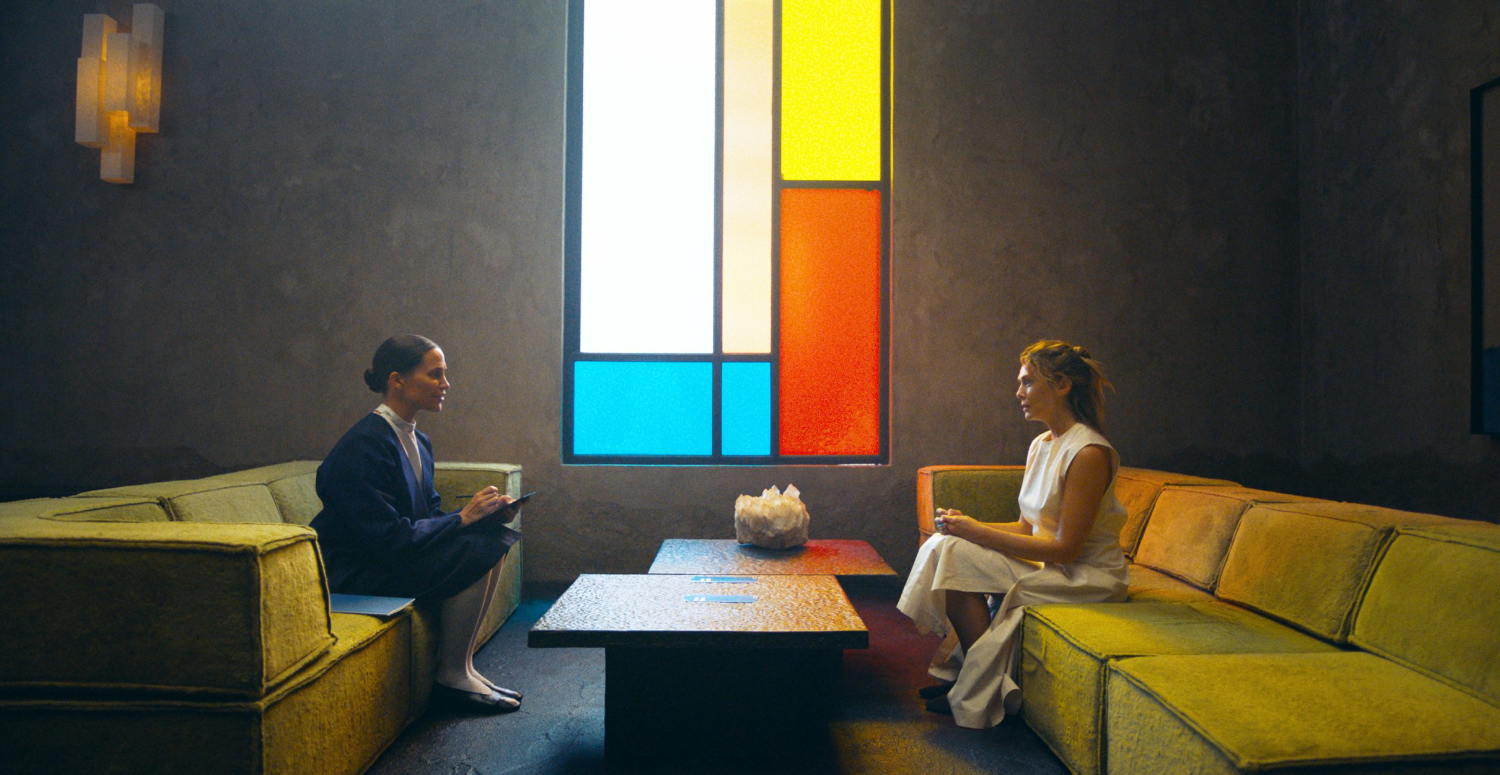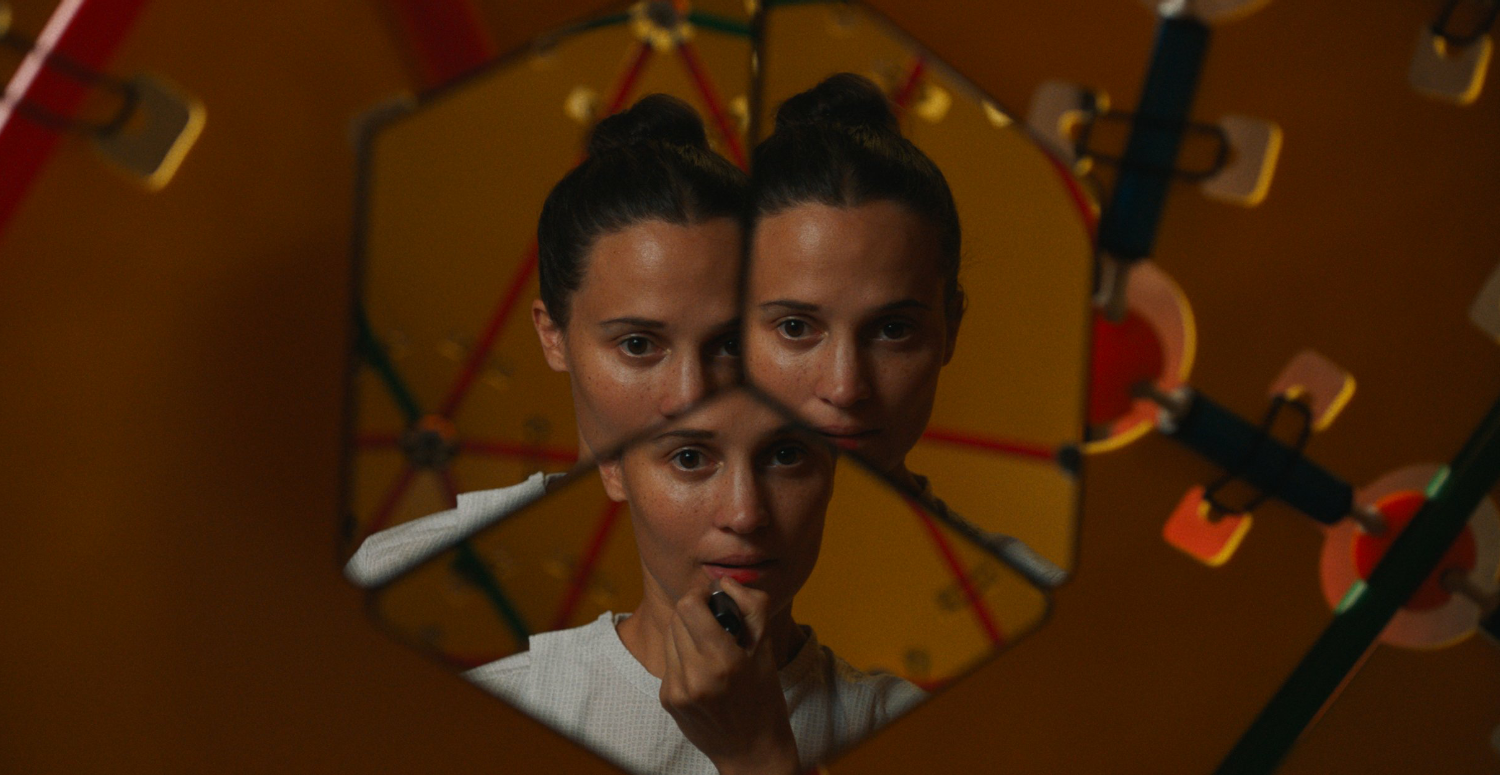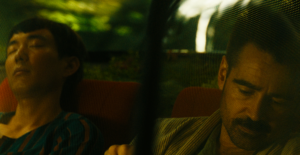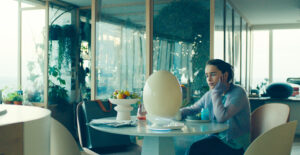L’Évaluation
The Assessment
2025

FR EN
Vers où notre société familiale se dirige-t-elle ? Que deviendront l’enfance et la parentalité dans un futur proche toujours plus incertain ? C’est dans ce cadre dystopique que ce premier film de la réalisatrice française Fleur Fortuné met en scène une étude psychologique et philosophique autour d’un couple désirant un enfant. Mais dans ce futur indéterminé, le monde a été grandement ravagé par le changement climatique rendant la vie particulièrement précieuse et rare. Les procréations sont alors contrôlées par l’État et une évaluatrice va donc passer une semaine (créatrice ?) avec ce couple pour déterminer s’il est apte pour accueillir un enfant dans son foyer et dans la société.
Si l’environnement futuriste est relativement relégué au second-plan c’est pour enfermer l’intrigue dans un huis-clos familial autour de ce trio de circonstance qui évolue littéralement dans une sorte de bulle – aussi bien en termes de décor (au sein d’un dôme climatique), que de cadre social (dans un monde futuriste où l’orgueil est roi), ou narratif (avec ce noyau familial métaphore de toute une société) – où le monde n’est alors plus vu que sous l’angle du couple et de la famille. C’est de la science-fiction conceptuelle qui aborde plusieurs thématiques du futur de notre civilisation à l’éducation parentale, en passant par la fertilité et les rapports de couple.
C’est un riche scénario moralement ambigu qui interroge dans une narration épurée, comment élever un enfant et comment un enfant (ou la volonté d’en avoir un) peut chambouler un couple dans sa vie quotidienne ou son intimité. Pour cela l’évaluatrice crée des problèmes et provoque des absences à gérer pour les parents dans une intrigue qui pousse les personnages à faire des choix parfois surprenants, parfois dérangeants. Le spectateur suit alors l’évolution de ce couple dans une ambiance à la fois calme & étouffante et lumineuse & malsaine pour conclure sur un triptyque philosophique entre espoir, désespoir et illusion questionnant le véritable fruit d’une telle évaluation.

Interprétant avec justesse et nuance ce trio de personnages, le film est porté par les excellentes performances d’Elizabeth Olsen (Wind River ; WandaVision), Himesh Patel (Yesterday ; Station Eleven) et Alicia Vikander (Le Jeu de la Reine ; Ex Machina). Cette dernière livre une nouvelle prestation hallucinante dans le corps d’une évaluatrice à la rigueur quasi religieuse et la frivolité très enfantine. Sa performance aurait pu tomber dans le ridicule, mais elle s’aventure plutôt dans l’ambivalent au gré de scènes où l’on en vient à douter à la fois des motivations (personnelles ou professionnelles) et de la nature de son personnage (évaluatrice ou objet d’évaluation). Les costumes des protagonistes ainsi que les vitraux aux couleurs vives font par ailleurs entrer un rayon d’humanité dans ce monde rigide reflété par une photographie aux tons feutrés et une architecture géométrique et froide. Les décors renvoient notamment à l’art abstrait géométrique de Piet Mondrian aussi bien pour sa contraction (huis-clos) que son affranchissement (dystopie) du réel.
« L’Évaluation » s’impose ainsi comme une œuvre aboutie aussi bien dans le fond avec un récit marquant que dans la forme avec une esthétique soignée, qui n’a malheureusement pas obtenue de sortie en salles en France, désormais directement disponible sur Prime Video …
Raphaël Sallenave
Where is our family society heading? What will become of childhood and parenthood in an increasingly uncertain near future? It’s against this dystopian backdrop that French director Fleur Fortuné’s feature debut presents a psychological and philosophical study of a couple’s desire to have a child. But in this indeterminate future, the world has been greatly affected by climate change, making life particularly precious and scarce. Procreation is then controlled by the state, and an assessor spends a week (of creation?) with the couple to find out whether they are fit to welcome a child into their home and into society or not.
If the futuristic world-building is relatively relegated to the background, this is to confine the plot to a family plot revolving around this trio of characters who literally exist in a kind of bubble – both in terms of setting (within a weather dome), of social framework (in a futuristic world where pride rules), or narrative framework (with this family nucleus as a metaphor for an entire society) – where the world is then seen solely from the perspective of the couple and the family. This is a conceptual sci-fi that tackles a number of themes, from the future of our civilization to parenting, fertility and couple relationships.
This is a rich, morally ambiguous scenario that, in a stripped-down narrative, questions how to raise a child and how a child (or the desire to have one) can shake up a couple’s daily life and intimacy. To this end, the assessor creates problems and absences for the parents to deal with, in a plot that forces the characters to make choices that are sometimes surprising, sometimes disturbing. The spectator then follows the evolution of this couple in an environment that is at once both calm & stifling and luminous & unsettling, to close on a philosophical triptych between hope, despair and delusion, questioning the true nature of such an assessment.

Portraying this trio of characters with finesse and nuance, the film is driven by the outstanding performances of Elizabeth Olsen (Wind River; WandaVision), Himesh Patel (Yesterday; Station Eleven) and Alicia Vikander (Firebrand; Ex Machina). The latter delivers another mind-blowing performance as an assessor of quasi-religious rigor and childlike frivolity. Her performance could have fallen into the realms of the ridiculous, but instead she ventures into the realms of the dubious in scenes where we are left doubting both her motivations (personal or professional) and the nature of her character (assessor or object of assessment). The characters’ costumes and brightly-colored stained-glass windows bring a ray of humanity into this rigid world reflected in muted photography and cold, geometric architecture. The sets echo Piet Mondrian’s abstract geometric art, both in its contraction (bubble) and its detachment (dystopia) from reality.
“The Assessment” therefore stands out as an accomplished work both in terms of substance, with a striking story, and of style, with a carefully crafted design, which unfortunately did not get a theatrical release in France, and is now available directly on Prime Video …
Raphaël Sallenave

